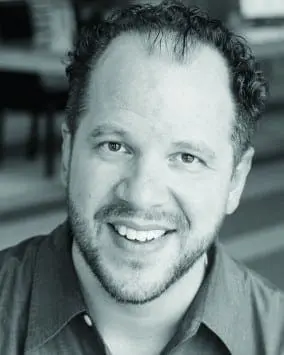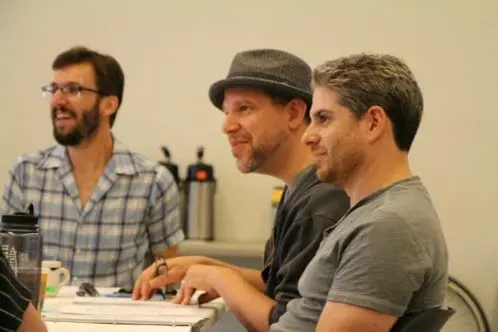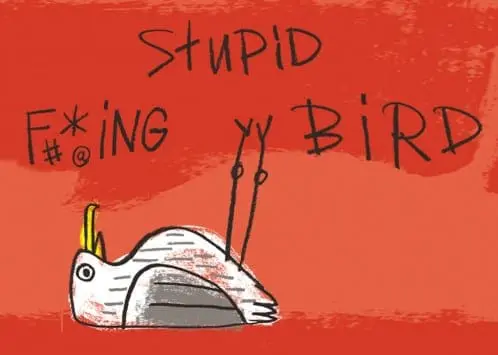Telling the Truth: An interview with Aaron Posner

Aaron Posner talks Chekhov, truth, and his role as playwright and director of his (sort of) adaptation of Stupid F**king Bird.
- What prompted you to adapt Chekhov’s The Seagull?
I love Chekhov and The Seagull. But the truth is… it is old and no longer speaks directly to our lives as I am sure it did a hundred and ten years ago. That does not make the play invalid—but it does make me eager to see the brilliant array of issues and complexities and relationships he crafted dealt with in a more immediate, more present manner. Look, there is no doubt: Chekhov was a great, great genius. And he has been copied, emulated and imitated by every playwright and screenwriter since he wrote. But his work—which once was radical—is now the ultimate in old fashioned and traditional.
With STUPID F**KING BIRD I was interested in seeing how I could make his stories of heartbreaking humanity a little radical again. I wanted to share my personal, current response to his masterpiece and see what would happen if I played in his playground… but on my own terms. That exploration turned into STUPID F**KING BIRD.
- What is it about Chekhov’s stories that are universally relevant?
They tell big stories about the small movements of our hearts and lives. His territory is territory we all recognize. It is full of everyday dilemmas and crises. What if we don’t get the person we love to love us the way we need them to? What if our family is driving us insane? What if our work fails to express our inmost souls? What if we can’t get what we truly feel we need to make us happy? These are the questions he is asking. And I think nearly everyone can relate to these kinds of questions in one way or another.
- When you began adapting STUPID F**KING BIRD, how do you know what to keep? What to change? What to cut?
I didn’t “keep” anything, per se. While my play is built on the bones of Chekhov’s play, there are no words from his play in my play. The characters and situations are certainly recognizable, but the characters are more like cousins, maybe, of the original characters in The Seagull. It is Chekhov’s playground, but it is my play. I use his amazing play as a jumping off place, but I wrote the scenes I wanted to see and explored the characters I was most interested in. The characters and moments that I did not find compelling I let slip away. I let go of all the things that felt of another time and place. I wrote only about those things where I had a strong personal connection and something to really say.
- What are you listening for when you hear a draft of your script read aloud for the first time? The second time? The third time?
The same things I am listening for whenever I hear a script, whether it is a new play by someone else or a classic like Shakespeare or Chekhov or Shaw: It is true? Is it clear? Will it take us on an engaging journey? Is the story being told worthwhile? And is the stage the right place to tell this story in this particular way? Those kinds of thing…

Photo: Aaron Posner (center) listens to the first read through of “Stupid F**king Bird,” with actor Dan Hodge (left) and Assistant Director Jesse Bernstein (right). Credit: Rebecca Cureton.
- This is the first time you’re directing STUPID FUCKING BIRD. What are the challenges to directing your own play?
It feels more like opportunities and pleasures than challenges. When I started to write this play I was determined to write a play that I would want to see. So while I have now seen this play maybe a dozen times at different theatres and with different casts and creative teams, I am still interested in it. Which is a very good thing… But mostly, I am loving what this exceptional group of actors and designers are bringing into it. They are sharing their own minds and hearts and spirits… and that is making the play utterly fresh again for me. When a play is trying to tell the truth about real things—and the artists approach it with real courage and generosity of spirit—then you have the possibility of something special happening on stage. This great group of artists is doing exactly that in a most wonderful way and I think we’re going to have a great production.
- People either love or hate the title of this play. The Arden audiences overwhelmingly love it (and so do we!), especially those who are familiar with Chekhov and The Seagull. How do you address those who are offended by it?
For better or for worse, I have not met many of the people who don’t like it. Maybe they just don’t want to talk to me! I am very sorry if I am offending people with language, but at least I have not hidden it anywhere. One thing I like about the title is it lets people know in no uncertain terms what kind of play they are going to see. If you don’t want to hear colorful language or are not comfortable with passion and nudity and adult complexities of life… than this is, perhaps, not the play for you.
- Chekhov reveals his insightful observations of humanity in his characters with the hopes that his audiences would reach self-awareness and recognize their own folly and foibles. In your adaptation it is the characters who grapple with self-awareness. Did you approach this script with the goal to use this meta-theatrical convention and directly connect the actor to the audience? Or was that a happy unintentional coincidence of the process?
I am acutely interested in the actor/audience relationship, and this play seemed like a perfect opportunity to explore the boundaries of this key theatrical relationship. Because both The Seagull and SFB [Stupid F**king Bird] are partially about theatre (and new forms of theater specifically), I chose to explore things that might make this play a new form of theatre in and of itself. To be clear: I make no claim that SFB is entirely new or radical… but it is pushing on some theatrical boundaries in new and hopefully effective ways. It is exploring the actor/audience relationship in ways I have not seen done before, and it is bringing a playful, game-playing sensibility to the stage.
And yes, the journey of self-discovery and self-expression is more immediate and on the surface in my play than in Chekhov’s. He is WAY subtler than I am. But then again, subtle is hard and he is a far better writer than I will ever hope to be.
Some have said I have my characters speak all the subtext or inner thoughts of his characters, and there is some truth to that. But the fascinating truth is… no matter how much subtext you speak—no matter how much you try to say everything you are thinking or feeling, no matter how transparent you think you are being—there is always more underneath. We are all onions… layers and layers and layers.

Photo: (L-R) Cindy De La Cruz as “Nina” and Aubie Merrylees as “Con” in “Stupid F**king Bird.” Credit: Rebecca Cureton
- What advice would you give to a young playwright interested in adapting classics for a contemporary audience?
Tell the truth. Be courageous and generous. Be smart and get good people on your team to help you. Figure out what you love about the work you are adapting, what you have to say to it, and what it has to say to you. Then give it your best shot!
- What insights have you learned from working on this play as a playwright? As a director?
Writing this play has changed my life and career in a number of wonderful ways. I wrote it in the full expectation that no one—or nearly no one—would ever produce it. I knew the kind of play I wanted to write, but I didn’t know if anyone would want to do it or see it. But it turns out– they do! I wrote it impulsively and without compromising, so I guess one big lesson would be that that can be a good thing. I wrote it without worrying about who would produce it—or even if anyone would produce it and that gave me a kind of freedom. And I wrote it to be the kind of play I wanted to see, and finding out that others want to see the same kinds of things I do has been very empowering.

“Stupid F**king Bird” runs September 15- October 16. For more information and tickets, visit www.ardentheatre.org or call the Box Office at 215.922.1122.
